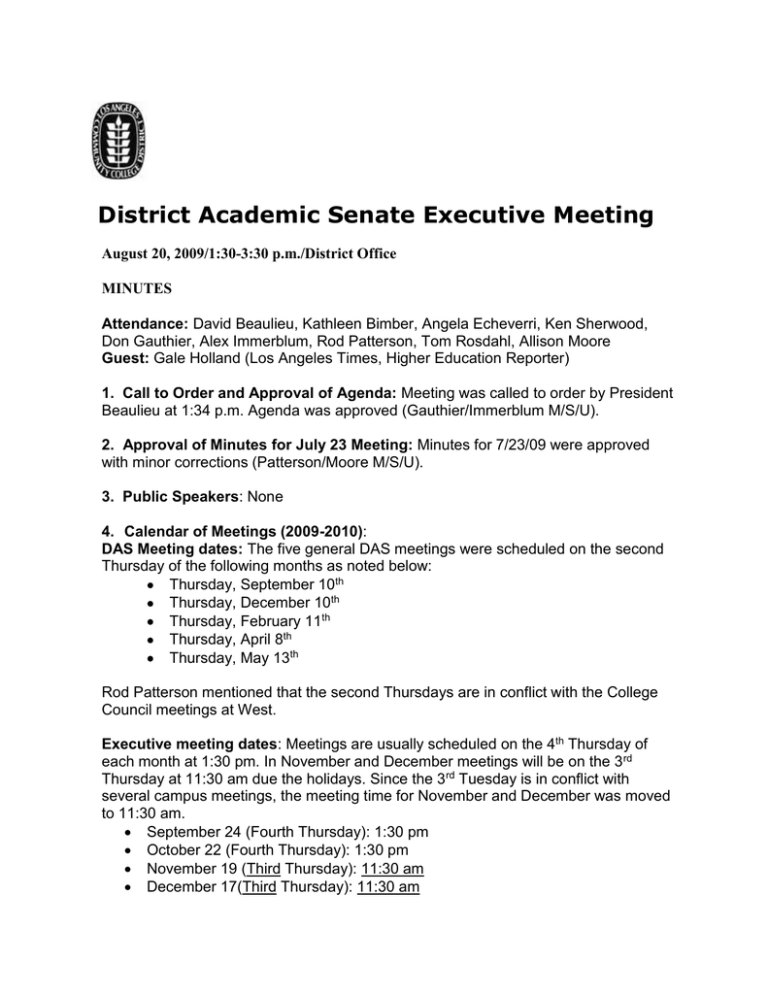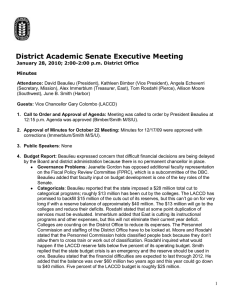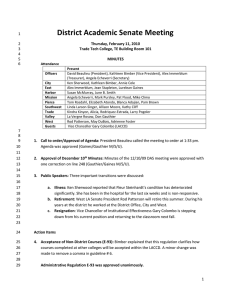District Academic Senate Executive Meeting
advertisement

District Academic Senate Executive Meeting August 20, 2009/1:30-3:30 p.m./District Office MINUTES Attendance: David Beaulieu, Kathleen Bimber, Angela Echeverri, Ken Sherwood, Don Gauthier, Alex Immerblum, Rod Patterson, Tom Rosdahl, Allison Moore Guest: Gale Holland (Los Angeles Times, Higher Education Reporter) 1. Call to Order and Approval of Agenda: Meeting was called to order by President Beaulieu at 1:34 p.m. Agenda was approved (Gauthier/Immerblum M/S/U). 2. Approval of Minutes for July 23 Meeting: Minutes for 7/23/09 were approved with minor corrections (Patterson/Moore M/S/U). 3. Public Speakers: None 4. Calendar of Meetings (2009-2010): DAS Meeting dates: The five general DAS meetings were scheduled on the second Thursday of the following months as noted below: Thursday, September 10th Thursday, December 10th Thursday, February 11th Thursday, April 8th Thursday, May 13th Rod Patterson mentioned that the second Thursdays are in conflict with the College Council meetings at West. Executive meeting dates: Meetings are usually scheduled on the 4th Thursday of each month at 1:30 pm. In November and December meetings will be on the 3 rd Thursday at 11:30 am due the holidays. Since the 3 rd Tuesday is in conflict with several campus meetings, the meeting time for November and December was moved to 11:30 am. September 24 (Fourth Thursday): 1:30 pm October 22 (Fourth Thursday): 1:30 pm November 19 (Third Thursday): 11:30 am December 17(Third Thursday): 11:30 am January 28 (Fourth Thursday): 1:30 pm Feb 25 (Fourth Thursday): 1:30 pm Mar 25 (Fourth Thursday): 1:30 pm Apr 22 (Fourth Thursday): 1:30 pm June 24 (Fourth Thursday): 1:30 pm Patterson/Sherwood moved to accept the DAS meeting calendar for 2009-2010 (M/S/U). Consultation Calendar: Beaulieu has contacted Interim Chancellor Wieder to schedule consultation meetings. There has not been a consultation since May of 2009 because of Chancellor Drummond’s departure. Beaulieu indicated he will try to schedule meetings on Monday afternoons or on Fridays. 5. Leadership Changes in the District (Beaulieu): Chancellor: Tyree Wieder’s one semester appointment as interim chancellor was announced yesterday; her tenure begins on Monday. The appointment may go longer if necessary. The Board of Trustees will discuss the selection of the search firm at a special meeting next week. Five firms applied to conduct the search; yesterday the Board narrowed it down to two firms. There has always been a District Academic Senate and Guild representative on the chancellor selection committee. The committee was chaired by Deputy Chancellor Barrera during the last search in 2006-2007. Beaulieu mentioned that she has announced that she will be a candidate for the chancellor position this time. Pierce College President: Beaulieu stated that President Bob Garber’s departure continues to be felt at the district and campus level. He is missed on the Emergency Task Force. Dean of Outreach and Recruitment: Dean Kaneesha Miller was being paid out of CAHSEE money, but she took a position at Long Beach Community College. Sherwood stated that it is important to maintain existing outreach and recruitment relationships with high schools. Beaulieu stated that the funding for the position is gone; it is not clear whether she will be replaced. Rosdahl stated that enrollment cuts will make it hard to get students that have been turned away to return to our campuses. Vice President Transfer: Immerblum announced that Vice President Katherine Burke-Kelly has been transferred from East to Trade without consultation. Immerblum expressed his consternation about the transfer. Echeverri inquired whether it was to help Trade with accreditation. BurkeKelly is on leave from East to fill the Vice President of Academic Affairs position at Trade. Immerblum stated that the Board is reacting to accreditation emergencies, but has very poor long-term planning. Moore inquired about the Strategic Plan presentations to the Board. Beaulieu replied the presentations should not be held at the home college. Three colleges will report on the same date. Trustee Scott-Hayes is still the chair of the Planning and Student Success Committee. Beaulieu added that there is no list currently of when and where Board committees meet. 6. Budget Report: The Board approved the District Budget Committee recommendations to address the budget shortfall which include a 50% reduction in winter, no furloughs, health insurance savings, GASB deferral, categorical cuts, and others. We have closed the budget gap this year, but will not be able to defer the GASB contributions indefinitely. Categorical programs were cut $22 million; the exact total of program reductions is a bit unclear because stimulus money may offset some of the cuts, and general fund money has been set aside to cover up to $12 million of the cuts. The colleges have been asked to figure out how to cut around a total of $10 million. Immerblum stated that East decided to cut primarily hourly counselors at their budget meeting. A plan to eliminate the winter 2010 intersession entirely was cancelled because Valley, East, West, and Pierce wanted to offer a winter session. Five colleges are canceling winter for all purposes (Mission, Harbor, City, Trade, and Southwest). The proposal does wreak havoc with Student Services. Additional shortfalls will have to come out of the contingency reserve ($25 million) plus the college balances (primarily from East and Pierce). The total LACCD balance is about $50 million. The contingency reserve is used when colleges run a deficit. We are right around a 5 % contingency reserve right now. Beaulieu stated he would summarize this information so Senate Presidents can inform their constituents. The Board will adopt the final budget at their September meeting. The Board Budget and Finance Committee met yesterday and the Emergency group will keep meeting. The other big concern is enrollment, because we are teaching students we are not being paid for. Patterson stated it is a balancing act, because if we turn them away, students may not come back later. Paterson inquired about reduced FTES targets (workload reduction). Moore stated that at Southwest all classes are full, and students are very demoralized and angry. Bimber added that for some students, not being able to enroll means losing their jobs. Beaulieu added that students are staying in school longer; it is harder for new students to get in, and they have less supportive services. The Budget and Finance Committee has to consider the impact of these cuts on Student Success. 7. Bond Program Report: Beaulieu reported that the Energy Oversight Committee met on Tuesday and that they are making progress on clarifying matters. The Bond Steering Committee is looking at revision of its mission statement at their next meeting. Beaulieu added that the Chancellor may want to set up an executive committee to monitor the bond program, with five college presidents and no faculty representatives. He reported that they had a good meeting with Larry Eisenberg yesterday in which they discussed Woody Clark’s compensation. Gauthier stated that consistent confusion is the modus operandi of the Build LACCD team. Sherwood agreed and added that Build LACCD has been inconsistent when identifying mandatory requirements versus guidelines. Gauthier said the Bond Steering Committee should be making recommendations instead of spending so much time trying to get accurate information. Echeverri expressed concern about having an additional executive committee without faculty representation. She added that having several oversight committees without clearly defining their functions and membership will make it more difficult for faculty to understand how the bond program is being managed. Beaulieu replied that the charge of the executive committee may not be broad-based, but rather to scrutinize the individual contracts as they come up to the Board. The Bond Steering Committee’s charge is to develop policy. How these three bodies will interface will need to be clearly defined. Additionally, there was a proposal to hire an inspector general, which would mean four arenas of oversight over the bond program. 8. Summit Plans: The original plans were to have the summit focus entirely on the Bond Program. Due to accreditation sanctions at the cityside colleges, budget problems, and leadership changes at the district, the focus has shifted. The latest proposal is that the summit focus on the bond program, budget, accreditation, student success in hard times, and Career Technical Education (CTE: green jobs, sustainability, etc.). Accreditation sessions should discuss the two district wide recommendations regarding shared governance. The originally proposed date of September 25th needs to be changed because Chancellor Tyree Wieder, Jamillah Moore, and Jack Daniels are not available. On September 18th there is a statewide CEO Board meeting, a Basic Skills Initiative regional workshop, and Rosh Hashanah. The summit will probably have to take place on October 2 nd or 9th. There was a discussion on possible topics for the general and breakout sessions. Bimber suggested a breakout on faculty advising. Others suggested breakouts on federal stimulus money and the pursuit of excellence in a time of challenge. For the general session Moore suggested having Wieder discuss CTE, stimulus money, and budget issues. The consensus was that panels were a good idea. The format will probably be an opening session followed by two breakouts. 9. Accreditation Update (Colombo): Vice Chancellor Colombo distributed two handouts: Graduation Rates for Entering Freshmen, Fall 1997 to 2004 and Critical Issues from the Three 2009 Cityside Reports. Acting Chancellor Barrera had asked George Prather for a report on UC graduation rates. Colombo stated that it takes about six years for entering students to obtain a bachelor’s degree, but Community College students graduate at better rates than students admitted to UC’s as freshmen. Colombo then briefly summarized the lessons learned from three cityside accreditation visits. He encouraged senate presidents to share this information with others at their campuses. The accreditation expectations have increased significantly. Colleges need to have extremely comprehensive program review and must document the use of student review to improve instruction. They must have formal and periodic documentation of all planning processes. Colombo offered to come out to campuses and talk to the local senates. The ACCJC made three district-wide recommendations; two of which are brand new and refer to district/ college relations (the functional map) and the evaluation of governance processes. They want both quantitative and qualitative evaluation of district committees. Colombo mentioned that Mission had completed a thorough evaluation of its governance committees. All colleges need to develop planning and governance handbooks. They are reviewing the membership of the District Planning Committee (DPC). DPC normally meets on Wednesdays between DBC and Board meetings. They will need to change the meeting day because there are only two Wednesdays in the fall that work (September and October). Colleges in the process of compiling their self inventory; they should develop institutional effectiveness websites by January. Colombo stated he has received three of the college self inventories so far. Once all come in, he will put them together and report to the Board. Colombo stressed that the local senates needs to formally review their self inventory and the ARCC numbers in the fall. Every other year District Research Office administers a Student Survey. The minimum number of sections sampled per campus will be 100, maximum 200. Faculty selected to distribute the surveys will receive cover letters between September 9 and 11; packets will go to campus mailboxes September 24-26. The contact person on each campus is the researcher, who may give a brief presentation on the survey at Council of Instruction or Senate meetings. 10. Update on Stimulus Grant Group Meetings: Bimber stated that if campuses are going to pursue the energy and transportation part of the stimulus money, proposals are due this week. Proposals need to define the scope of the projects. Not every campus was represented at the last meeting on Friday. Career pathways out of poverty will be discussed in a couple of weeks. Colombo stated that there is a huge amount of money ($12 billion over 10 years) coming in for college completion, most of it is focused on getting students in and through college. 11. DCC Report (Bimber): There are twelve items that are in various stages of completion: E-79 Competency Requirement: Brought back for a few changes, has been approved by DCC. Added Title 5 language on pages 2 and 3. Faculty requested a process set up to add another course to the list, which has been laid out on page 4. There is challenge process on page 4, which brings it back to the full DAS. The Curriculum chair should have discussed revisions with local curriculum committees; should be vetted in the Academic Senates as well. E-65 Curriculum Development and Approval: Standards and Procedures: Please review, as this regulation has not been changed in a long time. Language on course changes and cross-listing was cleaned up. On page 7 there is an important change on cross-listing that may be controversial. In the past crosslisting was done arbitrarily. Cross-listing is a district attribute, and once approved it applies to everybody else in the district. The revision keeps cross-listing as a district attribute and includes the District Discipline Committees in the approval process. Colleges will have one year from the date of implementation of the revised procedure to submit lists of courses to be cross-listed. E103 Repetition of Activity Courses: No major changes, not controversial. E55 Student Grievance Procedure: Need a student subcommittee to work on this regulation. Pattterson volunteered. E-12 Credits for Units Earned for Law Enforcement Academy Training: Title 5 to define credits earned for law enforcement training. Board Rule 6700 Academic Standards: It is becoming a big issue in terms of grievances. Board Rule 6202 Catalog rights: Defines when a catalog year begins. 6703.11 Acceptance of Credits: Had a problem because it was not clear how to apply credits coming from campuses with plus/minus grades. Courses accepted with a grade of C minus do not satisfy LACCD requirements of C or better grade for the major, but can satisfy course credit. 8605.10 College Policies and Procedures: Added language on a challenge because of Title 5 requirements. College Level Examination Program (CLEP) Credit: Elizabeth Atondo at Pierce helped with this. There are other ways students can earn credit. Regulation stipulates how credit can be used for general education credit; does not apply to the major. Each college faculty will decide whether to accept it. See the course list on page 3; these are the most requested ones. International Baccalaureate Credit: Still making changes. Please have faculty review this. Community Service Offerings: We have never had an administrative regulation about Community Services. Cannot use the term courses for Community Services classes, they must be called offerings. Community Services offerings do not go through the curriculum approval process. They must be approved by the college vice president or president and then the Board. Once approved, the state assigns each offering a code. 12. EPAC Report: Please get representative names to Kathleen Bimber. Immerblum expressed his concern with the Emergency Equivalency Process. Gauthier stated that we need to improve the current form. 13. Student Success Report: Postponed 14. DAS Reorganization Proposals: Postponed Two Vice President Suggestion EPAC Title Change Proposal Other Reforms 15. Proposed Future Actions and Announcements: David Esparza and Elizabeth Atondo will be working with Beaulieu on the Transfer Committee. There is a pretty big agenda for the SSISC meeting tomorrow. Gauthier requested that we move item #14 a little higher on the agenda next time. 16. Adjourn: Meeting was adjourned at 4:10 p.m. Minutes submitted respectfully by DAS Secretary Angela Echeverri

